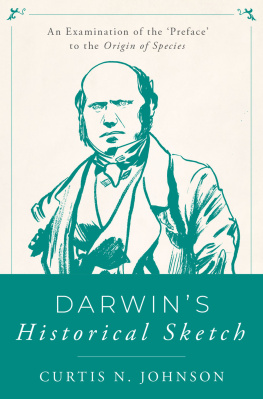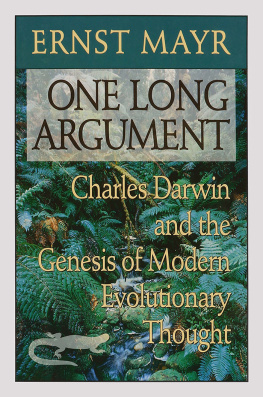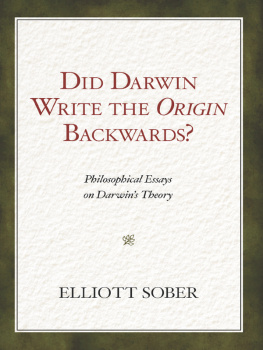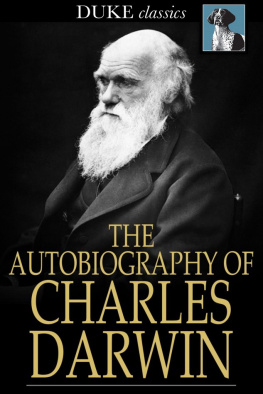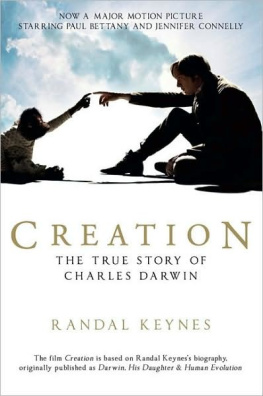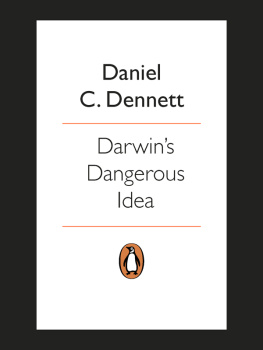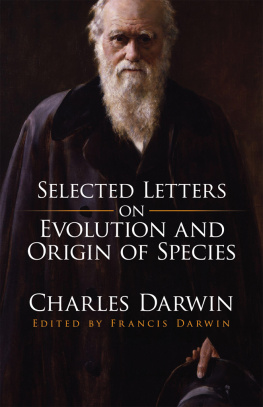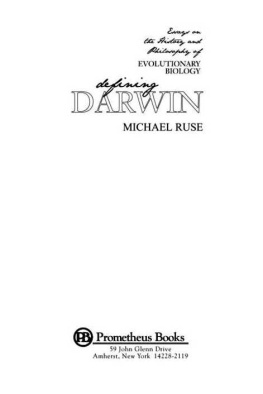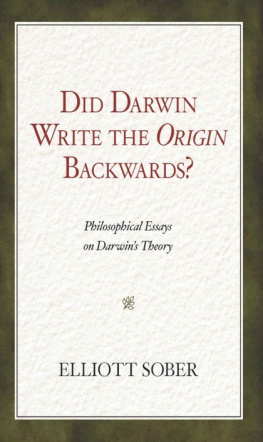DARWINS DICE

Darwins Dice
THE IDEA OF CHANCE IN THE THOUGHT OF CHARLES DARWIN
Curtis Johnson



Oxford University Press is a department of the University of Oxford.
It furthers the Universitys objective of excellence in research, scholarship, and education by publishing worldwide.
Oxford New York
Auckland Cape Town Dar es Salaam Hong Kong Karachi
Kuala Lumpur Madrid Melbourne Mexico City Nairobi
New Delhi Shanghai Taipei Toronto
With offices in
Argentina Austria Brazil Chile Czech Republic France Greece
Guatemala Hungary Italy Japan Poland Portugal Singapore
South Korea Switzerland Thailand Turkey Ukraine Vietnam
Oxford is a registered trademark of Oxford University Press in the UK and certain other countries.
Published in the United States of America by
Oxford University Press
198 Madison Avenue, New York, NY 10016
Oxford University Press 2015
All rights reserved. No part of this publication may be reproduced, stored in a retrieval system, or transmitted, in any form or by any means, without the prior permission in writing of Oxford University Press, or as expressly permitted by law, by license, or under terms agreed with the appropriate reproduction rights organization. Inquiries concerning reproduction outside the scope of the above should be sent to the Rights Department, Oxford University Press, at the address above.
You must not circulate this work in any other form and you must impose this same condition on any acquirer.
Library of Congress Cataloging-in-Publication Data
CIP data is on file at the Library of Congress
ISBN 9780199361410
eISBN: 9780199361434
For my family

Contents

THE SYSTEMATIC STUDY of chance in natures operations has an ancient pedigree, dating back at least to the writings of Empedocles (5th c. BCE) and Aristotle (4th c. BCE). If one were permitted to acknowledge debts to the no longer living, I would begin by acknowledging them. It is not simply that they wrestled with the idea of chance in nature; they did so in just the way Darwin did. Darwin himself was not directly influenced by these authors. I doubt he ever read anything by Empedocles, and his acquaintance with Aristotles writings came only late in his life, long after he had developed and refined his own ideas. But these two ancient thinkers put a Darwinian sort of chance into a long tradition of thought that is with us still.
Any work of this sort could not be undertaken without the insights of other scholars laboring in the fields. It would be impossible to give an exhaustive account of what I owe to all of these men and women, but I refer the interested reader to the bibliography for a register of most of my debts to other authors. Several of these stand out for special mention: the volume of collected essays edited by Gigerenzer, G. et al., eds., 1989; a two volume work edited by ; and several individual works by those whom I regard as leading authorities in the study of chance in evolutionary biology today, especially John Beatty, James Lennox, and Roberta Millstein. I have no personal acquaintance with any of these authors but my work has benefited beyond measure by the foundations laid by them.
I take special pleasure in acknowledging Darwin scholars who have read some or all of the ms. and made invaluable suggestions, all of which have led to improvements. I am especially grateful to my father, Dr. Albert Johnson, an expert in ecology, who read the entire ms. and provided keen advice at every stage; J. David Archibald, who, with a firm touch, took the training wheels off the bike; Michael Ghiselin, who from the beginning has been unstinting in his encouragement and willingness to share his knowledge of all things Darwinian; and David Depew, whose comments on an earlier draft of the central ideas contained herein awakened me to subtleties I had not yet seen. My debts to all four run deep. Any remaining defects are attributable to me.
I give special thanks to two of my former undergraduate students at Lewis & Clark College, Julia Eckes and Kris Lyon, both of whom helped immeasurably with editing and editorial assistance at various points in the preparation of the manuscript.
I also must convey my gratitude to the editorial staff at Oxford University Press: Hallie Stebbins, who was the first to take notice of and interest in the project; Jeremy Lewis, who seamlessly took over where Hallie left off; Erik Hane, my day-to-day contact at Oxford, and to Jayanthi Bhaskar for her grace and professionalism in shepherding the work through the labyrinthine details of the production process. I also thank the several external reviewers for Oxford U.P. who read and commented on the ms. with erudition and sensitivity.
My greatest debts are to my wife and daughters Sophia and Alexis, and my parents for constant encouragement and support. Sophia is the artist who produced the illustrations for the chapter headings; Alexis created the graphic on p. 59. Above all, I could not have undertaken this work without the untiring support and assistance in every manner of waytoo many to enumerateof my wife Loretta.


CHARLES DARWINS big idea is generally thought to be his discovery of the mechanism of natural selection in evolution. That discovery was without question a big idea. But, as Darwin himself often confessed, natural selection cannot work without prior variations in the organisms that will be selected or not for survival. Whence the variations, or at least what did Darwin believe about this? That is the question I examine in what follows. Darwin thought variations are in many or most cases just by chance. I hope to show what he meant by this expression and what he believed the implications are if one accepts it. Chance variation may have been an even bigger idea for Darwin than natural selection, or so I shall attempt to show.
Thus, whatever Darwinism is, this is not a book about Darwinism. Nor is it a book about contemporary evolutionary theory or the new synthesis or the extended synthesis. It is rather a book about chance in Darwins writing. To that extent it must confront Darwinism more broadly, even in its recent and contemporary incarnations, if only to situate the problems it deals with in a proper context.
But an answer to what is Darwinism is surprisingly elusive. Even if we grant that Darwinism is whatever Darwin said it is, the problems of identifying Darwinism only begin there. Darwins views seem to have evolved over the course of a long and prolific career as a scientist, author, and correspondent. Did he maintain a consistent position? Was Darwinism always the same thing to Darwin? Many scholars who have considered this question, perhaps most, have held and defended the view that his ideas did change, so that Darwinism as whatever Darwin said it is is a moving target (; Gayon, 2003).


